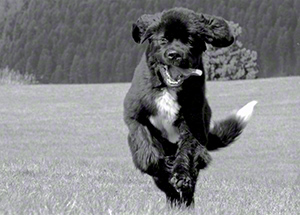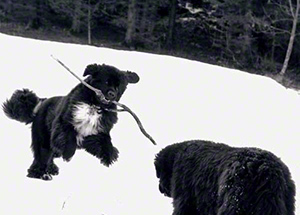A really consistent response to the recall command can remove the dog from danger, such as oncoming cars or a threatening dog, and allow your Newfoundland to experience the joy of off-leash rambles knowing that he will consistently and reliably return when called.
"As with any training, recall is all about putting a routine into your dogs day which he enjoys taking part in. Recall should never mean "if I run back to my owners, she'll put me back on leash" but always, "if I run back to my owner, it's usually worth my while". — Sue McCabe, Sirius Dog Training
Victoria Stilwell say that "Most puppies will 'come' to you whenever you decide to walk away because they instinctively follow you. Making this a reliable response, however, usually takes months of consistency and positive training. The easiest way to associate your new puppy or dog with the 'come' cue is to begin using it as soon as you bring him home and build the word up slowly."
This lesson needs to be taught at a very early age, and is one of the most easily learned tasks at that point in the puppys development. A breeder will begin shaping a recall as soon as the puppy begins tottering around. During recall training is also a good time to teach your pup his name as well as to come. Sit on the floor and call the puppy in a warm and welcoming manner. If he doesn't come at once, lure him with a small treat of food. And, when he arrives in front of you, offer immediate hugs and lots of praise. Make every trip to you a positive reinforcement of the command.
Be sure that the puppy responds EVERY time you give the command. If he chooses to ignore you, first try the food lure and as a last resort, physically have someone bring him to you. Consistency is the important factor. He needs to understand that COME means every time! NEVER use negative reinforcement when training a puppy to come. If he has done something naughty, carry him to the scene, but don't call him and then punish him when he comes. He'll soon learn that COME can be negative, and that should be avoided at all costs.
Don’t put your dog in a situation where his lack of reliable recall can endanger his life. That is, don’t take him off leash in places where he can run away and get into trouble until you are 100% certain he will respond.
— Pat Miller - Whole Dog Journal
Play the "COME" game on a consistent basis, but remember that your puppy has a very short attention span. A "come" or two is enough at any one time, so he doesn't lose interest in the game. Make sure that he is successful each and every time he responds to your command. Hugs and kisses work very well with puppies if you don't have treats handy, and they are rewarding to you as well!
Judi Adler, in her book "Water Work, Water Play - A Training Guide for Newfoundland Water Rescue Work" talks about how important a solid recall is for Water Rescue and many other activities. "Its usefulness will reveal itself in all sorts of situations, and once your Newf knows to come when its called it'll make training situation much easier and more pleasant."
Soon your puppy will be a youngster interested in moving out and exploring the world. Controlling him will be much easier if he has learned his "come" well. With the exciting lure of the wide outdoors, you will need to reinforce your command many times. At first, put a long line on the puppy. Let him wander and snoop a while and then call him in your warmest and most welcome manner. Don't be surprised if your wonderfully trained puppy from the house refuses to come when he has found the wonderful, enticing smells of the whole outdoors to distract him. But, DO insist that he come when called. A gentle reeling of the leash will probably be necessary. Do it every time. One slip-up gives him the message that "come" is an optional command.
It will probably be some time before your puppy can be trusted to respond absolutely reliably to your "come" command. Don't give him the opportunity to disobey. They learn that lesson all too easily. Keep him on a line dragging behind him so that you can control him even though he thinks he is running free.
Consie Powell, in her book "Newfoundland Draft Work - Guide for Training" reminds people of the importance of being positive and upbeat when training, especially for a recall. "A dog keys his behavior to the people around him. When you are happy and relaxed, your Newf knows that all is well, his world is secure and he can relax. In this frame of mind he can concentrate well and learn efficiently."
Of course, there is no absolute certainty that a dog will always respond to your command. There would be far fewer accidents if we could count on their responding every time. BUT, you can save yourself a lot of heartache and just plain aggravation by teaching your puppy that he MUST COME.
Please note, the above system works with older dogs too! You just need to have more patience and practice longer!
Based on the article "Come Puppy Come" by Frank and Carol Winnert first published in NewfTide, 2000

